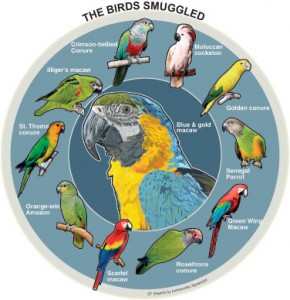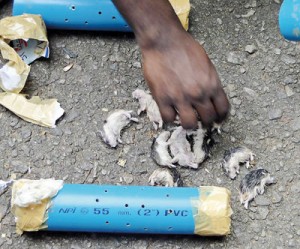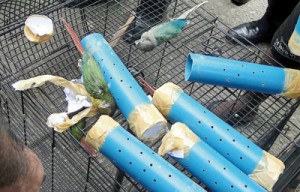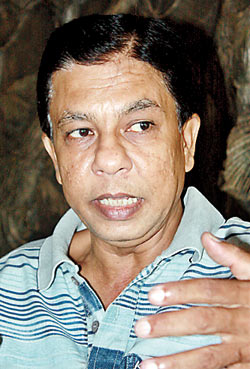News
Bird smugglers after Blu and Jewel
- Lanka hub for illegal global trade; Customs rescue exotic birds in PVC pipes
- Environmentalists sound alarm; foreign animals can spread new diseases
- Racketeers thrive in the absence of proper monitoring; macaw priced at Rs. 1.2 m
An increasing number of Customs detections in recent months of attempts to smuggle in exotic birds and animals have raised questions whether Sri Lanka has become a lucrative market and a regional hub for a multi-million rupee illegal trade.
Customs officials have rescued exotic birds, including cockatoos, parrots and macaws, and even reptiles after they were found in smugglers’ bags. Each of these birds carry the tale similar to the macaws named Blu and Jewel in the animation film Rio. But the real life stories of these birds have no happy endings. Theirs is a story of torture and a virtual death sentence. The villain in their story is the bird smuggler.
In most cases, the birds and reptiles had been tranquillised and crammed into 18-inch-long PVC pipes that had a few ventilation holes, Customs officials said. In a recent case, Customs found tranquillised parrots stuffed into PVC pipes with both ends plugged by paper and tape. Animal activists said the detections were only the tip of the iceberg; many smugglers get away undetected.
A Customs official said that not only birds and reptiles, the smugglers even bring in ornamental fish, rabbits kits and hedgehogs. “Recently we found six bunnies stuffed inside two lunch boxes,” he said. “In one smuggler’s bag, we found three-inch-long baby hedgehogs stuffed in PVC pipes.”
He said the racket was growing and some big timers had resorted to smuggling in these exotic animals in large cargo containers.
A Sunday Times investigation revealed that the illegal trade is flourishing with the minimum price of an exotic bird being Rs. 80,000 in the local market. But in the international black market, a pair of Great White Cockatoos are worth more than Rs. 600,000 and a blue and gold macaw fetches Rs. 1.2 million and a Green winged macaw Rs one million. A Senegal parrot is worth more than Rs. 100,000.
Former Customs Deputy Director Samantha Gunasekara, who was credited with the setting up of the Customs’ Biodiversity Protection Unit (BPU), charged that the racket was thriving because of political influence and the connivance of some corrupt state officials.
He said some racketeers would produce forged or questionable documents and walk out of the airport with the illegal cargo. Those who bring in endangered animals and birds are required to produce a CITES (Convention of International Trade in Endangered Species) certificate.
Activists say the racketeers produced forged CITES certificates that could be bought in countries like Thailand and the Philippines for a few dollars.

Three-inch-long baby hedgehogs stuffed in PVC pipes
In one case, the Sunday Times learns that an importer who had political connections with the previous regime brought in 121 birds from Thailand, while there was bird flu pandemic in that country.
He was able to get the birds released due to his political influence even though his documents were incomplete. He had declared that the value of the birds was around Rs. 2 million, but the Customs estimated the value to be more than 13.5 million.
Mr. Gunasekara said the racket is so widespread that the Customs’ quarantine area was not enough to accommodate the animals detected.
He said Customs investigations had found that birds and eggs were smuggled in from countries such as Thailand, the Philippines and Malaysia.
Asked what happened to the animals after they were detected and brought to the quarantine area, he said they were handed over to the national zoo.
But the Sunday Times learns that zoo authorities transfer the birds to a farm where the food for the zoo animals is grown. But this is where the birds mysteriously disappear. It is believed the birds once again end up with the smugglers while their cases are pending.

Customs found tranquillised parrots stuffed into PVC pipes with both ends plugged by paper and tape
While some of the birds and animals are sold in the local market, most of them are re-exported to other countries, claiming they have been bred in Sri Lanka. False CITES certificates are also prepared to back their claims.
Denying reports that the racket is thriving with the connivance of some Customs officials, the Customs’ media spokesman Lesli Gamini said they were vigilant and they continued to make detections. But wildlife activists are not convinced.
They are concerned over the ease with the birds and animals are taken out of the Customs without proper quarantine and the ecological consequences of these birds being introduced to an alien environment.
Supun Lahiru Prakash, a researcher at the Biodiversity Conservation and Research Circle, said animals endemic to Sri Lanka would face extinction due to the threats from invasive species and their hybridization with local species – a process that results in the contamination of the genetic pool.

Former Customs Deputy Director Samantha Gunasekara
On the other hand, he said the unimmunised foreign animals could also spread their pathogens and diseases among the local animals, affecting the country’s livestock and poultry industries and even harming people.
Environmentalist Nadeeka Hapuarachchi said the Customs, Zoo authorities and the Wildlife Department should stop playing the blame game and instead work out solutions such as finding a proper place to house the animals which were detected by the Customs.
He said Zoo authorities had the expertise to deal with exotic animals, but if they say they did not have a proper place to keep them, the Wildlife Department should step in to provide an answer.
Mr. Hapuarachchi said he was opposed to the business of re-exporting the animals as the process was a virtual death sentence as it involved anaesthetising the animals and subjecting them once again to a torturous journey.
Wildlife Department Director General H.D Ratnayake acknowledged that finding a place to keep the animals was a burning issue requiring an urgent solution.
“These foreign animals have lives, too. They need a place, but the issue is that the department deals with mainly local animals. Even if we agree to look after the foreign animals, the process involves finding a proper place, recruiting people and providing them training. In addition, we require funds and we need to prepare a proper plan,” he said.
Mr. Ratnayake also said that he too believed that most smugglers use Sri Lanka as a hub for this illegal trade, but he denied allegations that the Department was issuing CITES certificates to racketeers.

